The Discreet Charm of the Bourgeoisie, 1972, directed by Luis Buñuel, written by Luis Buñuel and Jean-Claude Carrière.
It's a truism that the 1970's were a golden age for mainstream recognition of difficult films. But if you want to really demonstrate to someone exactly what that means, don't sit them down in front of Mean Streets or The Conversation. Put in The Discreet Charm of the Bourgeoisie and tell them that the Academy of Motion Picture Arts and Sciences—the same stodgy, conservative voters who chose Ordinary People over Raging Bull just a few years later—named The Discreet Charm of the Bourgeoisie Best Foreign Language Film of 1972. It's impossible to imagine it even getting distribution today.
If you had to, maybe you could sell it with a clever bait-and-switch trailer, because stripped of tone and context, the onscreen events don't seem that far from, say, The Secret in Their Eyes. Consider the following plot points. The minister of a corrupt South American country uses his diplomatic pouch to smuggle cocaine. One revolutionary is dragged off by the secret police; another is tortured with an electrified piano. A young boy poisons his stepfather's nightly glass of milk. A priest gives a dying man absolution and then shoots him in the head with a shotgun. One dinner party ends with a duel, the next with the guests lined up against the wall and machine gunned. And there are more dreams-within-dreams than Inception. But because this is Buñuel, the only thing anyone wants to talk about are their dinner plans.

It's hard to imagine for a film with so many events, but The Discreet Charm of the Bourgeoisie doesn't have much of a plot—or to be more precise, there isn't any causal relationship between one event and the next. To be clear, Buñuel does have something on his mind here: no matter how loosely connected and absurd the film's sequences may be, they are all thematically linked. Each section of the film is built around a failed attempt by the main characters to eat dinner together, and each meal is interrupted by something good members of the striving classes don't discuss at the table: death, sex, religion, crime, the military. And, of course, South American death squads.
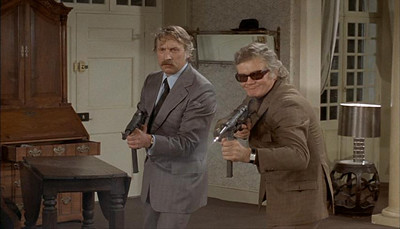
Strivers denying their animal natures—that's the kind of thematic material that could quickly become boring and pretentious, especially in a film as uninterested in Hollywood narrative conventions as this one. But Buñuel manages to avoid this with a remarkably deft comic touch and precise control of the film's tone, which is never strident or humorless (nor, on the other hand, too forgiving). Consider the scene where Don Rafael Acosta—representative of South American kleptocracy Miranda—pulls out a sniper rifle and starts taking potshots at a young woman out his office window.
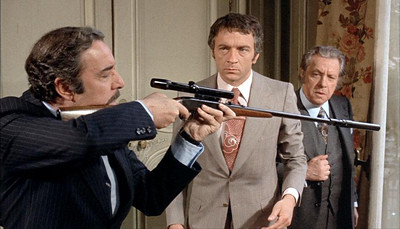
Fernando Rey plays Acosta; the other bourgeoisie in that shot are Jean-Pierre Cassel (Vincent's father) as Henri Sénéchal and Paul Frankeur as M. Thevenot. In a pretentious version of Discreet Charm, Sénéchal and Thevenot would be unmoved, or would enthusiastically help Acosta out. In Buñuel's version, they're a little put out and concerned, but only a little—they're certainly not going to make a fuss about it. That's the tightrope Buñuel successfully walks in scene after scene: as horrible as his characters are, he's not unsympathetic. After all, how can you hate people who make such wonderful Martinis?1
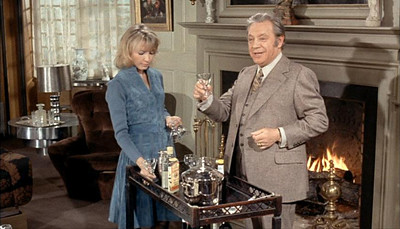
A little sympathy is the difference between an effective satirist and a strident bore, and the film as a whole is a useful reminder that the opposite of "funny" is not "serious." Between failures, social humiliations, duels, murders, gardening, and garden variety adultery, Buñuel repeatedly cuts to shots of the principal cast walking down the road through open countryside.
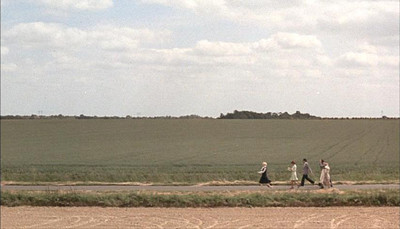
The film's Wikipedia article says that in these shots, the characters are lost and wandering, but I don't see it. They're always moving at a good clip, lapping the miles, never moving backward, devouring the future like locusts. No one in The Discreet Charm of the Bourgeoisie would ever see The Discreet Charm of the Bourgeoisie. Guess who's running the studios?
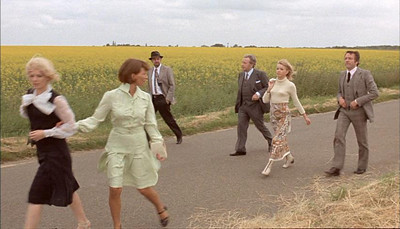
Randoms
- I'm going to be much less wordy going forward, at the cost of being less thorough. The whole point of this project, for me, was to see a lot of great movies, and one a month isn't going to cut it. So I'm certain there will be many things I leave out (nothing here about the film's women, all of whom are marvelous—especially Stéphane Audran's steely hostess? For shame!) Perhaps we can discuss things in more detail in the comments.
- The DVD features an excellent documentary about Buñuel's life and work, including his early years bumming around with Dalí and Garcia Lorca. Most interestingly, there's a short film called El náufrago de la calle de Providencia, which has footage of him enthusiastically explaining how to make various cocktails. Apparently he appreciated a good Martini just as much as Thevenot.
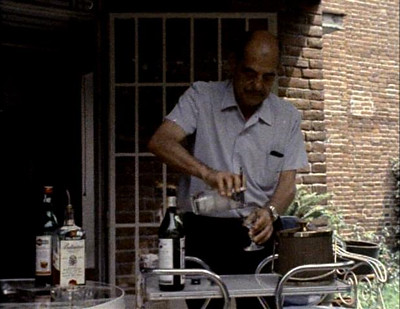
- It seems that Cooper Black was the Trajan of 1972 (or at least the Futura). It's in the opening credits of The Discreet Charm of the Bourgeoisie, and also John Huston's marvelous Fat City. Which is kind of strange if you're used to seeing it on iron-on t-shirts. Here's the strangely inappropriate title screen:
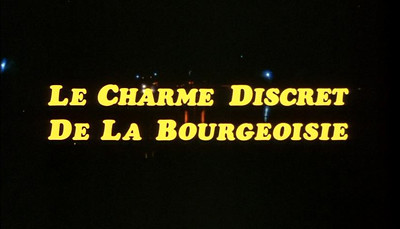
1Or claim to make wonderful Martinis, anyway; I didn't notice him shaking it to waltz time.


13 comments:
buñuel definitely loved his martinis =]. the other buñuel trait that one of the characters has is his disdain toward the cello ... that and the ambassador's birthday (and consequently his astrological analysis). and it doesn't surprise me those traits are contained the characters he critiques ... after all, this is the same guy who famously declared "thank GOD i am an atheist!" =]
i take the title and the film's tone as "these are the kind of problems you *want* to have." if the worst these characters have is not having their dinner plans fulfilled, then the rest of us should be so lucky.
also - when you get it (and you will get to it) - metropolitan had a nice jab toward the film since it was being discussed by the young aspiring new york elite/socialites ... and interestingly by someone who decreed that the entire "preppy class" was "doomed to failure." i guess buñuel can be sympathetic before giving the kick =]
Matthew, you've done a masterful job in thoroughly covering the first 101, and I think you've more than earned the right to speed up the process! I look forward to enjoying more of your insights here more frequently.
It's been a few years since I watched Discreet Charm so I don't have much to add. Besides the scenes you covered, my most vivid memory is of some guy hiding underneath a table eating some meat. What was that all about again?
@Dave: Acosta opts to save his own skin by hiding under the table while his friends are gunned down. As the gunmen are looking for him he cannot resist grabbing his piece of lamb from the table and they spot him. As they kill him he is chewing the meat and he wakes up, still chewing.
Hi! Ardent reader but first time commenter. While I'm a bit sad that you may be less in-depth with these hereon out, I am excited that you'll be going at a faster rate. I love reading these, and am looking forward to what you think of some of my favorites that are coming up, like the next one: The Lady Eve! Ooh, and we've got Tati coming up, too...
Anyway, as for this film: I saw the "stretch of road" scenes as not so much an aimless path where they're lost and wandering (I think that Wiki author misspoke) but on a literal road to nowhere, and completely set on walking down it, even though there's nothing there. There's nothing on it, no sign that they're headed anywhere of real interest. It's a metaphor for their values, their desire to keep up appearances (such as having the dinner party) that ultimately has no real purpose whatsoever, and blinds them from the more important and pressing matters in life. (Certainly not my interpretation, I must give credit to acquarello's very concise summary of the film.) I love how you pointed out some characters' concern for what others were doing, but the complete inability to act on those brief moments of moral objection. I hadn't noticed that, and it sheds some more light on how Bunuel handles his comedy than how others do it. I was sure there was a dryness to it that I couldn't put my finger on, and now I have some more ideas. Thank you!
While I'm not much a fan of Bunuel I do love this movie. I've never been sure if this is success on his part, but the characters despite being so despicable are also as enjoyable to watch as any other set of characters out there. Even the requisite jabs at the church seem to be done with a very polite smile. While I think that similar approach for Tristana kills off the thematic arc it is an essential aid to Bunuel here.
Also glad to hear you're speeding up the reviews. Can't wait to hear you talk about Double Suicide and The Scarlet Empress (speaking of that last one it might be best to either watch the European disc or a rip from TCM, the Criterion is not pretty).
@DJProject—unsurprisingly, I love Metropolitan and can't wait to get to it. If only they'd release Barcelona!
@Dave & Jack—maybe it was just me, but the thing I remember about that shot is that the lamb seemed to be perfectly cooked.
@Vidal—I'll buy that interpretation; the Wikipedia version just seemed obviously wrong, since they're moving with such purpose. Maybe that shot looks different from 2010, though, because I think it's safe to say they've arrived.
As far as their moral obliviousness besides respect for societal conventions, the best example is the soldier who sits down with the women at the restaurant and confesses to being a parricide; they're much more put out by the fact that he sat down with them than the fact that he apparently killed his father.
@Legato—Perhaps I'll watch both the Criterion and TCM one and compare. I am completely in love with The Last Command and can't wait to see more Sternberg. To say nothing of how excited I am to write about The Lady Eve, one of my all time favorites.
"No one in The Discreet Charm of the Bourgeoisie would ever see The Discreet Charm of the Bourgeoisie."
Love that sentence; it's an excellent summation.
I agree with you about Wiki's interpretation of them walking down the road. For me, the images bring to mind a self-centered lot that's always moving determinedly forward, like you say. Also loved:
"A little sympathy is the difference between an effective satirist and a strident bore..."
I suppose this is the difference between a Hot Fuzz and a Scary Movie. It seems to me that one has great affection for what it's satirizing while the other only seeks ridicule.
Glad to hear you'll be posting more. You've been a great motivation for me.
I think it's not just sympathy for the genre or mode of filmmaking, but for the characters themselves that makes the difference between satire and mere spoof. A satire works best when the audience and filmmakers can see themselves reflected in the ridiculous situations. If the characters are just mercilessly mocked you've got something that's just a condescending put-down.
Also, I think the Scarlet Empress disc looks perfectly good, but that's just me. It's definitely a good candidate for Blu-Ray treatment, hopefully.
I saw this film so long ago, and I was so young at the time, that I had forgotten a lot of the detail and all of the analysis. It was good to put my scattered memories of it back into context. Or at least what little context there is.
I didn't like this film the first time I saw it some 15 years ago, but really enjoyed it when I caught it a couple of years ago on my own crazy Criterion completist quest. I think the first time I saw it, I tried to "understand" the film and was frustrated. The 2nd time I just let the droll humor and absurd situations wash over me, and consequently enjoyed it much more (I've learned that this is also the only way I can appreciate Fellini). I now understand why it's considered such a masterpeice, but I must confess I like That Obscure Object of Desire even better. Both that and Diary of a Chambermaid are films to look forward to (if you liked Discreet Charm; I can't tell from your post).
I can understand why you're shortening your essays. I know those long essays took a lot of time. I was inspired to start with you when you were at #59, and have worked forward to #248 and backward to #21. I'm sure that not having to post anything contributed to my progress.
Good luck with the faster pace. There's some real gems ahead.
I was actually quite surprised by how much I enjoyed watching this film.
So much for more than one post a month, huh. Now I wish these things enabled smilies.
A great appreciation. I like the bit about the purposeful walking, which in a way is as condemnatory of the characters as being purpose-less. Making them more single minded and mercenary in their goals.
What do you think of Phantom of Liberty? Rather than dreams within dreams that is more stories within stories with instead of a variety of ironic punchlines Bunuel and Carriere drop every story just as it is about to get interesting! Very frustrating if you want closure, but a nice way to present a variety of scenarios without having to develop them!
Post a Comment